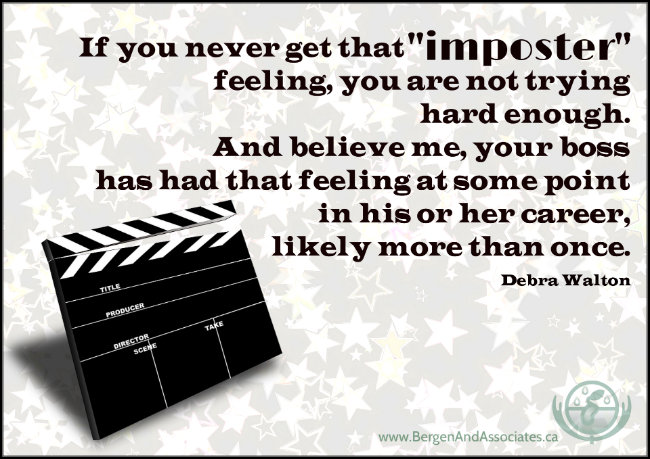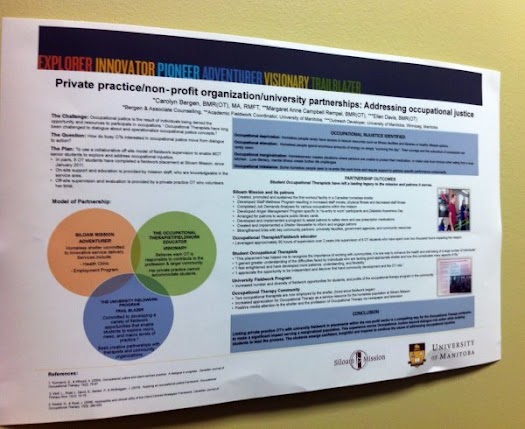Small confession here…I’ve taught at the university for years, but have always been intimidated by the whole academia thing…I’ve sometimes felt that if they really knew me, they wouldn’t ask me to teach…because, y’know really, you should be really, really smart to work at the university.
I’ve read about this in the literature as “imposter syndrome”…and so I can sometimes talk myself through it (and sometimes not). I’ve been teaching for about 11 years…and I’ve been evaluated…and they still ask me to come back and teach, so I use that to convince myself that I really am able to teach students about our craft.

So…small confession continued…the academic process is also intimidating to me. I use evidence based literature all the time, but the thought of contributing to the body of academia has never been something on my radar…again, that’s something that, you know, only “smart people” do, and so I’ve never thought about it as something I could do.
But, as part of the ongoing process to reduce my hypocrisy in facilitating and encouraging clients to
- stop limiting themselves with small thinking, and
- to face their fixed (and false) ideas about themselves, and
- to learn to tolerate the discomfort of their anxiety with working through it and tolerating it, rather than merely avoiding it…
sigh, I decided to take the plunge and give it a go.
I did it in a way that was similar to how I might walk a client through it.
Baby steps that are manageable, with support along the way:
- I found a significant reason/passion that made the risk feel “worth it”. The cost/benefit analysis won me over to take the risk. In this case, it was seeking to encourage the broader Occupational Therapy community to consider working with universities and non profit agencies to find innovative ways to bring students and their enthusiasm, energy and fresh ideas to work with programs who work with marginalized folks. The students get great exposure/experience, and the non-profit organization (who work with limited budgets) gets valuable human resources to work on important projects. The experience of working with students at Siloam Mission has gone so well, it didn’t make sense to keep this from the wider community who could potentially replicate it. (The fact that I’ve gone on and on and on in this paragraph gives you a hint of the passion I have for this).
- Even though it was a big step for me, I found ways of making it manageable. It started off with the fact that I didn’t do hard core “research” in my first effort with a randomized controlled clinical trial, but rather a description of a project that I was involved in. And…all I did at first was submit an abstract for consideration.
- I chose to consider the submission of the abstract as a success in itself. I decided that even if it wasn’t accepted, I “won” in conquering my belief that I couldn’t participate in professional conferences as a presenter. It wouldn’t be a failure to not be accepted…it would be almost a relief that I got to step 1 this time, and that would pave the way for another, more knowledgable attempt the next time. Did I mention–baby steps?!
- It wasn’t accepted for verbal presentation at the conference but for poster presentation. BIG step back. I was disappointed…and a little (or a lot) embarrassed…and hid with this email for several days…and then took a deep breath and told my colleagues about it…who kindly had some “righteous indignation” about that which felt very supportive as they disagreed with the reasons given…as well as reality orientation…it HAD been accepted in another format, after all. I had been sorely tempted at the time to decline the opportunity to present a poster, have the whole thing go away, and pretend that I never submitted… (As is typical, those with imposter syndrome see anything less that total success as utter failure–thus the important grounding of colleagues)
- I put the whole thing away for a bit. I was going to have to do a poster…never having done one before…but there was no rush because there was several months. I got on with the business of living and forgot about it. The break was nice.
- Then I confessed my anxiety to a colleague who gave me some samples to get ideas, googled for information on how to format a poster (got good helpful, concrete advice about how to make a poster with Microsoft PowerPoint), and tucked into it. She wasn’t horrified by my anxiety, but charmingly, seemed somewhat amused that I was so freaked out about it–this fixed idea that I had no business delving into something only smart people did struck her as sweetly humorous. That was important for me to see.
- I went to Starbucks to start it…a place that feels relaxing and enjoyable…made starting this…that I was anxious about…a little less awful. Lattes make life a little less awful which then translates into “barely tolerable”. I set myself a deadline to get a first draft done and out of the way. I didn’t like working on it, because it forced me to be in touch with the part of me that doesn’t feel competent. It was hard working on it because my anxious not-quite-good-enough part was alive and well in my consciousness…and so it was tempting to avoid working on it…more because I wanted to avoid that part than anything else. I actually had set a deadline for Thursday noon one week, but got on a roll and found myself ready late, late Wednesday night.
- I got help. Colleagues know more about this stuff than me, and they re-worked what I gave them to work better. They told me of details I couldn’tve known. They were fun, and excited, and encouraging…validating my ideas even as they improved on them. Then they handed it over to Pam Wener, who’s done a ton of these posters, and she re-worked it yet again to make it even better. Pam is a colleague that I’ve worked with closer than anybody as we have the same content areas…and when she so graciously volunteered her time, it turned from an anxiety-invoking experience into an inspiring one that had me feeling humbled and awed by the support and caring of colleagues.

So…the Canadian Association of Occupational Therapists conference starts today in Quebec City…my poster, Private Practice/Non-Profit Organization/University Partnerships: Addressing Occupational Justice is on the plane.
It was stressful, but I battled, tolerated, and conquered…just don’t ask me to do it again right away. ☺






Write a Comment